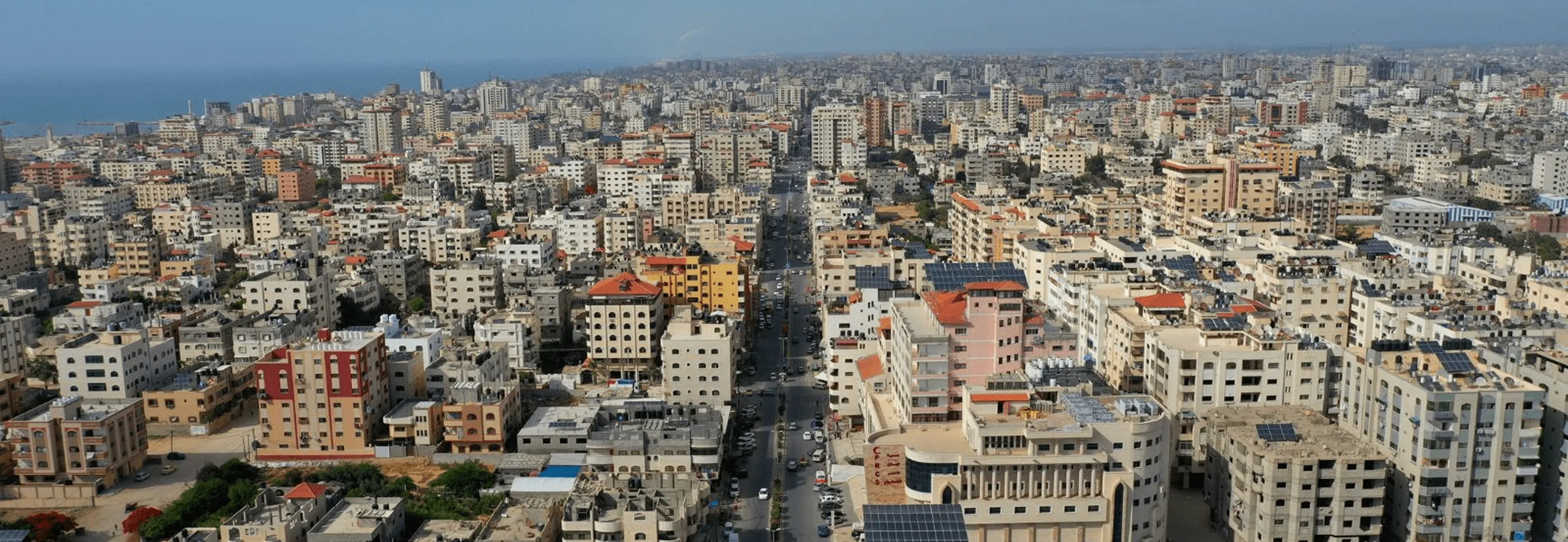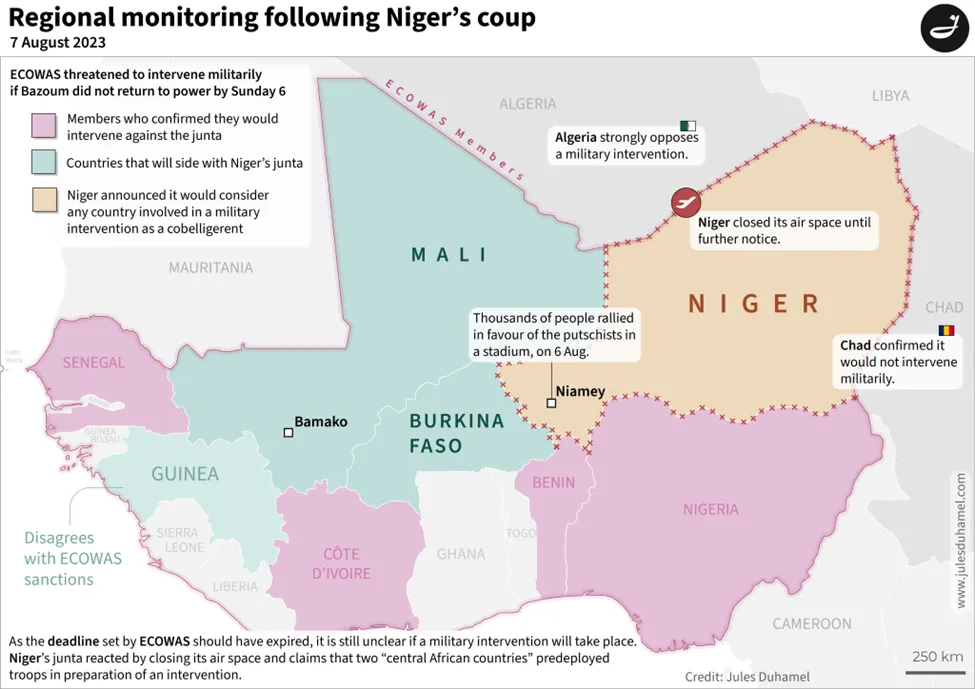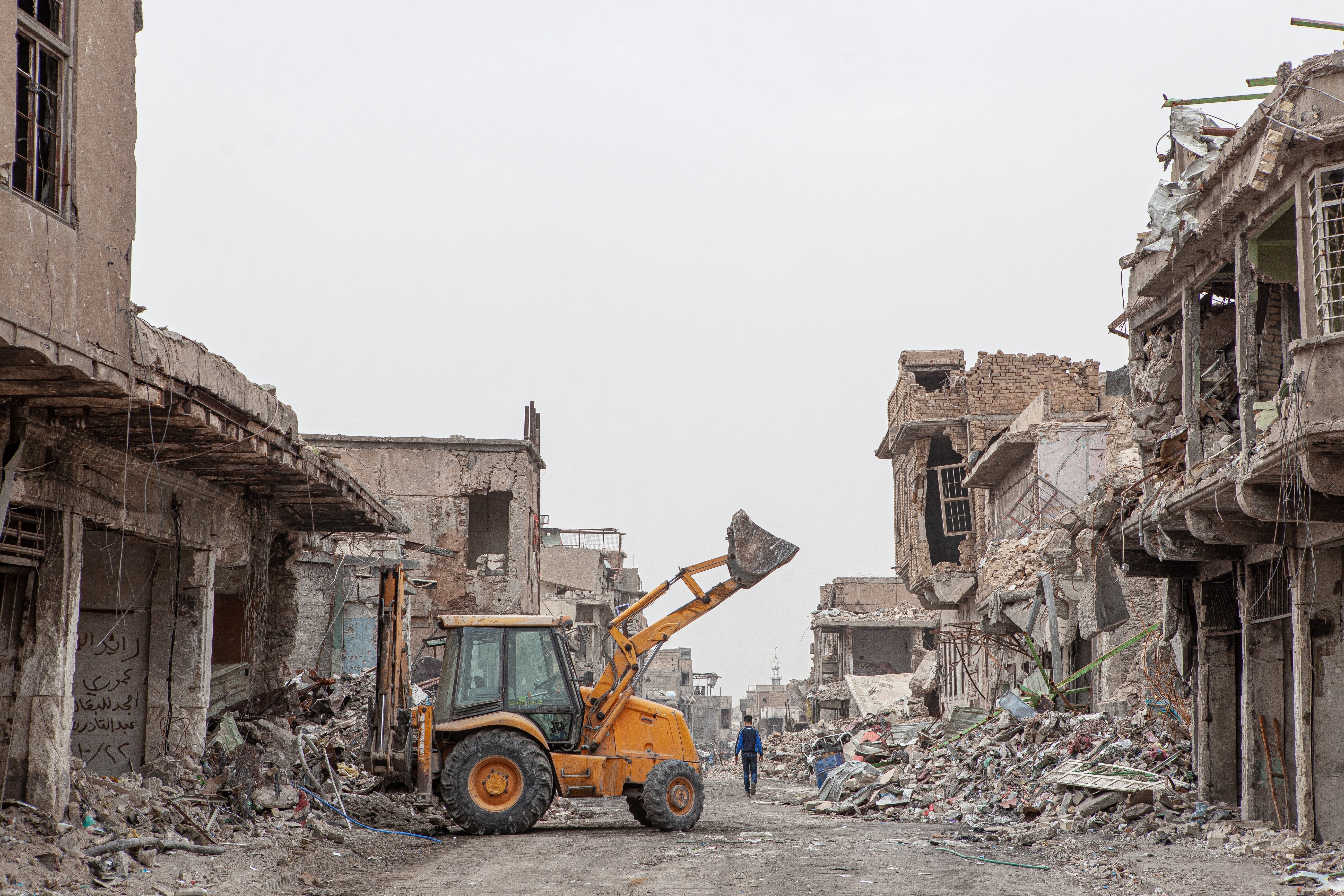
Unpacking Niger's Coup and Regional Implications
What began as a familiar rivalry among leaders in Central Africa has escalated in a coup by the army in Niger against the democratically elected president Mohamed Bazoum. This situation now carries the potential risk of a regional war as ECOWAS threatened to intervene militarily to reinstate the president. Their recent visit to the capital Niamey didn’t include meetings with coupe Abdourahamane Tiani or the deposed president, adding complexity to the situation.
The military junta has vigorously asserted its readiness to counter any military intervention using armed force. Mali and Burkina Faso have both aligned with the junta, warning that an attack on Niger as a declaration of war against them. During last Friday meeting in Abuja, Nigeria, ECOWAS chiefs of staff unveiled the framework of a possible military intervention against the junta, specifying the required resources as well as deployment plans, and giving the junta an ultimatum.
However, the deadline for the restoration of democracy or the prospect of facing military intervention lapsed on Sunday, August 6, with no sign of a military intervention by neighbors. Tens of thousands of defiant junta supporters filled Niamey's largest stadium on Sunday, expressing their frustration with ECOWAS and rallying behind Gen. Abdourahmane Tchiani, the military official asserting authority. In addition, Niger closed its airspace, citing concerns about the possibility of external military intervention.

The coup plotters in Niger have announced that they will retaliate “immediately" in case of "aggression or attempted aggression" against their country by the regional organization. "ECOWAS being impersonal, any aggression or attempted aggression against the State of Niger will see an immediate and unannounced response by the Nigerien Defence and Security Forces on one of its members, with the exception of suspended friendly countries," said one of the putschists, referring to Burkina Faso and Mali. At the same time, if ECOWAS countries seem to have sufficient competent troops for effective military action, they lack essential assets to deploy a successful multinational operation, such as logistics and finance.
President Bazoum, who is detained at his residence by the military, published a statement in the Washington Post on August 3, saying that he called on the US government and the whole international community to help restore constitutional order and to fight for “our common values”. He also reminded his audience about devastating consequences of the coup, including Russian influence propagated by the Wagner group in the Sahel region.
Simultaneously, the coup leaders declared that they denounced several military agreements concluded with France, including the stationing of the French detachment and the status of the soldiers present in the context of the anti-jihadist fight. Faced with the casual attitude and reaction of France to the situation in Niger, "the National Council for the Safeguarding of the Fatherland [CNSP, military in power] decides to denounce the cooperation agreements in the field of security and defense with this state", said one of the putschists. About 1,500 French soldiers, not counting members of the special forces, are present in the country. 1000 US troops are also stationed in 2 military bases.
Since the coup, relations with Paris have deteriorated. Incidents during a demonstration in front of the French embassy on Sunday led to the emergency evacuation of 577 French people. Protests continued and broadcasting of French media was cut off on the day of the celebration of the 63 years of the independence of Niger from France. Access to the French embassy and other nearby chancelleries was also blocked by Nigerien security forces.
A regional war in the Sahel would mean serious geo-political changes. One could fear that the region may collapse now that the G5 Sahel—a regional group of countries promoting development and security—is led by four juntas. Among the five members, Burkina Faso, Niger, Mali, and Chad have recently experienced an undemocratic transition. Mauritania remains an exception for the time being. Niger is the fifth country in West Africa to experience a coup d’état over the past three years.
Despite multiple sanctions imposed by the African Union and ECOWAS in recent years, the regional coup leaders appear to be challenging the credibility of these African organizations. The current coup in Niger serves as a crucial litmus test for their authority. Nigeria—which chairs ECOWAS and shares a one-thousand-mile border with Niger—needs a win in this moment, as Tinubu just assumed presidential office a little over two months ago.
This does not bode well for Western and in particular European interests. It is not only the security policies that need reviewing. It’s the whole approach to development and institution building. Western approach to addressing security challenges in the Sahel region, where substantial investments were made in security and defense training for stability, especially coming from France, raises questions about the effectiveness of these efforts and highlight the persistent security threats.
The coup has sparked pressing concerns about the fight against Islamist militants in the Sahel, a vast semiarid region where Al Qaeda and Islamic State-linked groups are rapidly advancing, moving from the desert towards coastal areas. A significant portion of the Sahel coincides with Africa's newly established, coast-to-coast coup belt.
One should not underestimate how strategic Niger is for France. French energy supplies, for instance, come from uranium mining in Niger. The country is one of the largest producers of uranium in the world. Meanwhile, Niger continues to suffer significant humanitarian needs due to conflicts, displacement, food insecurity, child malnutrition, and epidemics. The violence affecting several regions continues forcing people to abandon their homes, displacing around 376,000 people across the country. Additionally, 255,000 refugees have fled insecurity from neighbouring Burkina Faso, Mali, and Nigeria.
A lot is at stake for France in particular. Its remaining influence in the Sahel is collapsing. It has 2500 soldiers based in Chad and Niger—France’s last two key strategic partners in the region. The troops were left without any clear roadmap after Operation Barkhane ended in 2022 and France withdrew from Mali after ten years of presence; During the same period, European troops under the command of France in the Takuba Task Force withdrew from Mali, and French forces participating in Operation Sabre left Burkina Faso in under a year. A complete withdrawal from Niger would have dire consequences for France, which is why the coup has capture French attention, as it directly impacts France’s vital interests in Africa.
Meanwhile, Russia, which has not supported the coup in Niger, is looking for opportunities. Moscow does not hesitate to lend its support to countries under coup leadership, solidifying its role as a partner to these countries. Russia is eager to prove that it is not isolated after the international response to the war in Ukraine. It has used Africa to circumvent Western economic sanctions and rebuild its forces via the Wagner Group, which is active in the Central African Republic and Mali.
There, the countries’ gold, diamonds, and sugar serve as bargaining chips for the security services of the private militia. But Russia is starting to appear weaker globally, especially after Wagner Group leader Yevgeniy Prigozhin’s rebellion exposed the leaks in the Russian defense apparatus. The redeployment of Wagner’s forces to Africa following their ousting from the Ukrainian ground was also negatively perceived in African circles. Even the Russia-Africa Summit has revealed a weakened impression of Moscow: this year’s convening in St. Petersburg gathered only seventeen heads of state, whereas the first convening in Sochi in October 2019 gathered forty-three heads of state—as Russia was just beginning to re-engage with the continent for the first time since the fall of the Soviet Union. Russia’s recent suspension of the agreement to export grain from Ukraine only accelerated the weakening of its image on the continent. Clearly, Africa remains a challenge for Russia, too.
The United States, meanwhile, has redirected its focus to the European continent to support Ukraine and to protect its strategic interests. But the Niger events show that US strategic interests still run through Africa.
As the Sahel region grapples with this complex and precarious situation, global attention remains fixed on the evolving dynamics. The recent events in Niger have not only highlighted the fragility of regional stability but have also underscored the intricate interplay between geopolitical actors, international influence, and power dynamics. The junta's brazen defiance of African organizations like ECOWAS has brought the credibility of these institutions into question, and the looming possibility of a regional conflict adds a sense of urgency to the situation. The coming days and weeks will be crucial not only for the stability of the region but also the potential reverberations on a global scale, particularly concerning European security and economic interests. However, amidst this strategic chessboard, it's crucial to acknowledge the deep human cost that often gets overshadowed by geopolitical considerations. Efforts to stabilize the region should prioritize protecting civilians and ensuring their access to vital services.



.jpeg)